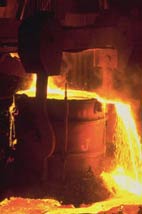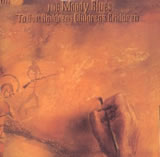| |
 |
 |
FACTS ABOUT LEAD (NOT INCLUDING LED ZEPPELIN):
How are We Still Exposed to Lead Today?
|
|
OK, all of you who remember someone in third grade saying you could get lead poisoning from chewing on a lead pencil raise your hands. If you did chew on pencils and assert that the lead poisoning caused you to act up and fire spit balls at the person in front of you, put your hand down and stop messing with us!
The "lead" in pencils is, of course, not lead at all—it's graphite, and it can't give you lead poisoning (though eating it still seems about as sensible as scooping out a yummy spoonful of that stuff inside an Etch-a-Sketch). But
 people older than 40 likely also remember the days of stories about toddlers getting lead poisoning by eating paint chips and about all of us being exposed to lead via sources such as leaded gasoline and lead pipes. Unlike the "lead pencil" thing, these stories were not myths.
people older than 40 likely also remember the days of stories about toddlers getting lead poisoning by eating paint chips and about all of us being exposed to lead via sources such as leaded gasoline and lead pipes. Unlike the "lead pencil" thing, these stories were not myths.
So, what is the status of these and other lead problems? Over the last few decades, we've seen great reductions in lead exposure from gasoline, food and beverage cans, house paint, industrial emissions, drinking water, and consumer goods. As a result, children's blood lead levels have declined over 80% since the mid-1970s, and the number of children considered "poisoned" has dropped by over 90%. While this is generally a success story, the Centers for Disease Control report that 900,000 children in the US between the ages of 1 and 5 have elevated levels of lead in their blood.
With all the efforts to eliminate lead contamination, one might rightly wonder where lead is still found in our environment.
- In paint: Lead-based paints were banned in the US in 1978, but many older homes still contain lead paint. In some cases, it may be hiding under layers of non-lead paint or wallpaper. Paint chips, flakes, and powder from aging paint can be a major source of lead exposure, particularly for children.
- In air (from leaded gas): The US began to phase out leaded gasoline in 1976. By 1986, most vehicles used unleaded gas, and lead in gasoline was fully banned in 1996. Over that period, atmospheric levels of lead have improved steadily. Unfortunately, many other countries are still using leaded gas, continuing to pump lead into the air they breathe. The World Health Organization has called for a global ban on leaded gas.
- In air (from other sources): Sources of atmospheric lead in the US also include the burning of solid waste (i.e. garbage), coal, and oil; emissions from iron plants, steel plants, and lead smelters; and tobacco smoke.
- In soil: Lead has settled from the air into the soil and remains a problem in many areas. Children are more likely to be exposed by this route because they play on the ground.
- In water: Lead can contaminate drinking water, usually due to the lead in certain pipes, solder, and fixtures.
- In computer components and electronics: Lead is found in circuit boards and CRT screens. Given the continuing rise of the computer age, this source of lead has yet to be dealt with effectively.
The health effects of lead can be subtle but devastating. In the next Eco-Logical, we'll all become lead-heads as we get smart about what the nasty stuff does to those who have it in their bodies.
|
|
GLAZED AND CONFUSED |
|
Is lead contamination in wine a concern? Not exactly. The concern is mostly over what's used to store the wine (or other acidic beverages and foods). Some ceramic-coated cookware, lead crystal, or pottery can leach lead into the stored beverage or food. This is mostly a problem with imported containers and cookware, since US law restricts the amount of lead that is allowed to leach into consumables from US-manufactured items. However, beware of older ceramics where the smooth ceramic surface is starting to degrade.
|
|
|
Go to Part 2
Get Grinning Planet free via email
|
| |

The sun is still shining, look at the view;
The moon is still dining, with me and you.
Now that we're out here, open your heart
To the universe, of which we're apart...
"Sun is Still Shining"
The Moody Blues
To Our Children's Children's Children
Progressive Rock
|
|
 Despite the dire possibilities we face in the 21st century—the dark clouds on our horizon—the sun IS still shining. This wonderful album from the Moody Blues examines life on earth from a space-traveling perspective. The music is both space-themed and spacey, and the melodic musings about all the places "out there" help bring clarity to one's thoughts about our place right here. It's all beautifully supported by the Moodies' chorused lead guitars, excellent singing, and wonderful mellotron underpinnings.
Standout tracks include "Eyes Of A Child," a soft tune that perfectly captures the wonderment of a first space experience; "Floating," a bouncy song about exploration in a low-gravity environment; "Beyond," an excellent, spacey instrumental; "Out And In," which revels in the spiritual glory of exploration; "Gypsy," a driving tune about a traveller of "a strange and distant time"; "Eternity Road," a rather haunting but highly enjoyable song about an endless journey; and "Candle Of Life," a song that manages to be aching and majestic at the same time. There really isn't a mediocre moment on To Our Children's Children's Children; the Moody Blues really outdid themselves on this one.
Despite the dire possibilities we face in the 21st century—the dark clouds on our horizon—the sun IS still shining. This wonderful album from the Moody Blues examines life on earth from a space-traveling perspective. The music is both space-themed and spacey, and the melodic musings about all the places "out there" help bring clarity to one's thoughts about our place right here. It's all beautifully supported by the Moodies' chorused lead guitars, excellent singing, and wonderful mellotron underpinnings.
Standout tracks include "Eyes Of A Child," a soft tune that perfectly captures the wonderment of a first space experience; "Floating," a bouncy song about exploration in a low-gravity environment; "Beyond," an excellent, spacey instrumental; "Out And In," which revels in the spiritual glory of exploration; "Gypsy," a driving tune about a traveller of "a strange and distant time"; "Eternity Road," a rather haunting but highly enjoyable song about an endless journey; and "Candle Of Life," a song that manages to be aching and majestic at the same time. There really isn't a mediocre moment on To Our Children's Children's Children; the Moody Blues really outdid themselves on this one.
Get more reviews, hear clips, or get purchase info for this album at
Amazon.com
|
See more Songs for a Better Planet
|
Back to joke page | More articles, by category
FREE AUDIO CLIPS

|
|
|
|
|
Hey, we don't pick
the Google ads! – GP
|
| |
| CLICKS ON OUR ADS AND PURCHASES VIA OUR AMAZON LINKS HELP SUPPORT THIS FREE SITE... THANKS! |
|
|
"Despite progress, lead poisoning remains one of the top childhood environmental health problems today. Without further action, over the coming decades large numbers of young children may be exposed to lead in amounts that could impair their ability to learn and to reach their full potential."
— President's Task Force on Environmental Health Risks and Safety Risks to Children [2000]
|
|


